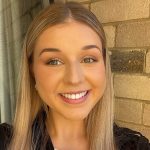
Miranda Wallace
Indigenous Health Scholarship
University of NSW, NSW
Doctor of Medicine
Scholarship Awarded 2022
Sponsored by:
learnmed and Dr Ian Fitzpatrick Bequest
How will I contribute to improving Indigenous health as a qualified medical practitioner or health worker?
Since pursuing Medicine, I have established a few objectives for myself which I will stay true to my career as a qualified medical practitioner. The first is that I will ensure to always dedicate part of my working career to bettering the quality of and access to health care for Aboriginal and Torres Strait Islander Peoples. This is of course influenced by the inequities my own family has faced and those of my Indigenous friends’ families as well. I continue to stay in touch with the health issues that exist in remote communities through my involvement with societies like the Rural Allied Health and Medical Society and the Australian Indigenous Doctors Association and I would like to extend this involvement to speak on issues and inspiring future Indigenous doctors.
Secondly, I would like to complete a rural placement in an Indigenous community. Not only would I gain valuable skills and experience due to the lack of health practitioners, I would have an opportunity to establish a strong relationship with the people of the community and work to re-gain their trust in the health system which has been degraded generation to generation. i understand that having a compassionate and understanding doctor in these communities is so incredibly important to creating better health outcomes of our people.
Further to a rural placement, I would like to practice back home in my regional area, Newcastle/Lake Macquarie or surrounding areas. It is really important to me that I go back to where I was raised and bring fresh knowledge and expertise wherever it is needed. Additionally, in every location worked I would gain valuable insight into the specific health needs of that community and adapt. I would think that my placements are studying in Sydney and then hopefully a rural location would prepare me well for this placement.
I have taken a specific interest in Obstetrics which may change during the course of my study as I am not limiting myself , however, I am very interested in having a had in facilitation the practice of ‘birthing in country’ which allows Indigenous women to have their babies on land where they feel comfortable and around their loved ones.
I would like to work in rural and regional areas where I can create good relationships and connection with the patients in that community and hopefully inspire the youth in those areas to also give back.
Current Progressive Report
I am incredibly grateful for the support I have received from Australian Rotary Health and my sponsors, which has allowed me to dedicate myself fully to my studies and clinical placements. My final term of third-year medicine was a period of growth, filled with hands-on learning, complex patient care, and meaningful experiences that have shaped my approach to medicine.
One of the highlights of this term was attending the Indigenous Queensland Murri Carnival with Nura Gili, where I provided medical assistance to athletes on the side-lines. Assisting with shoulder dislocation revisions and suturing injuries in a fast-paced sports setting reinforced the importance of quick decision-making and practical procedural skills. This experience was vastly different from my hospital placements, offering insight into the intersection of sports medicine and community healthcare.
During my aged care term at St Vincent’s Hospital, I gained a deeper understanding of the complexities surrounding ageing, end-of-life care, and the social challenges that many elderly patients face. I was actively involved in ward rounds, where I had the opportunity to take bloods from patients, improving both my technical skills and confidence in patient interaction. Many of the patients I worked with had complex medical needs, and I witnessed first-hand how multidisciplinary care plays a crucial role in ensuring their wellbeing. These experiences reinforced my appreciation for patient-centred care and the ethical considerations involved in balancing autonomy and safety in elderly populations.
A particularly inspiring moment this term was attending PRIDOC 2024 and the Australian Indigenous Doctors Association (AIDA) Conference. Being surrounded by Indigenous doctors, students, and health professionals from across the Pacific region was both motivating and grounding. The discussions on healthcare disparities, as well as the successes in Indigenous health, strengthened my commitment to addressing these gaps in my future practice. Seeing the work being done to improve health outcomes for Indigenous communities reaffirmed my passion for advocacy and culturally safe care. It was also lovely to see the involvement that Rotary has in improving health outcomes for our Indigenous people.
Reflecting on this term, I feel incredibly privileged to be on this journey. The financial support from Rotary has been instrumental in allowing me to focus on my studies and clinical experiences without additional stress. It has enabled me to return home regularly to stay connected with my family, maintain my study commitments, and engage in valuable extracurricular opportunities like PRIDOC and the Queensland Murri Carnival. These experiences have been crucial in shaping the kind of doctor I aspire to be—one who is not only clinically competent but also compassionate, culturally aware, and dedicated to serving the community